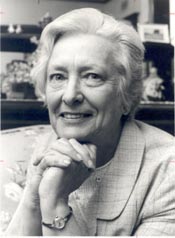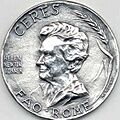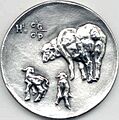Helen Alma Newton Turner facts for kids
Quick facts for kids
Helen A. Newton Turner
|
|
|---|---|

Newton Turner in 1973
|
|
| Born | 15 May 1908 |
| Died | 26 November 1995 (aged 87) |
| Nationality | Australian |
| Alma mater | University of Sydney |
| Known for | Research into sheep genetics |
| Awards | OBE AO Farrer Memorial Medal |
| Scientific career | |
| Fields | Genetics, statistics |
| Institutions | Commonwealth Scientific and Industrial Research Organisation |
Helen Alma Newton Turner (1908–1995) was an important Australian scientist. She was a geneticist, which means she studied how traits are passed down in living things. She was also a statistician, someone who works with numbers and data. Helen became a top expert in sheep genetics and worked for CSIRO, a big science organization, for 40 years!
About Helen Newton Turner
Helen Alma Newton Turner was born in Sydney, New South Wales, Australia, on May 15, 1908. She went to the University of Sydney and graduated with honors in 1930. She earned a degree in architecture.
After university, she worked briefly in an architect's office. But soon, she started working at a science lab called the McMaster Animal Health Laboratory in 1931. She was a secretary there for a famous scientist, Ian Clunies Ross.
Helen became very interested in statistics, which is about collecting and analyzing numbers. Her boss, Ian Ross, helped her train in the United Kingdom with famous statisticians Frank Yates and Ronald Fisher.
She came back to CSIRO in 1939. She worked as a consulting statistician for the Division of Animal Health and Production. During World War II, she also helped with government departments. She worked as a statistician until about 1945. In 1946, she became a technical officer in the same division.
Improving Sheep Breeding
In 1956, Helen Newton Turner became a senior principal research scientist at CSIRO. She led important research into sheep breeding. She earned another science degree from the University of Sydney in 1970.
Newton Turner changed how sheep breeding was done. She introduced new ways to measure sheep traits. This helped farmers choose the best sheep for breeding. She used quantitative genetics to improve the quality and amount of wool from Merino sheep. This made a big difference for Australia's wool industry.
From the late 1960s to the late 1980s, she traveled a lot. She visited many countries to check on sheep development programs. She shared her knowledge and helped improve sheep farming around the world.
Helen Newton Turner passed away on November 26, 1995. In 1993, an award called the Helen Newton Turner Medal was created in her honor. This medal is given to people who do great work in animal breeding and genetics.
Awards and Recognition
Helen Newton Turner received many awards for her important work:
- 1953 – Queen Elizabeth II Coronation Medal
- 1974 – Farrer Memorial Medal
- 1977 – Officer of the Order of the British Empire (OBE)
- 1980 – FAO Ceres Medal
- 1985 – Rotary Medal for Vocational Excellence
- 1987 – Officer of the Order of Australia (AO)
Images for kids
 | Aurelia Browder |
 | Nannie Helen Burroughs |
 | Michelle Alexander |



